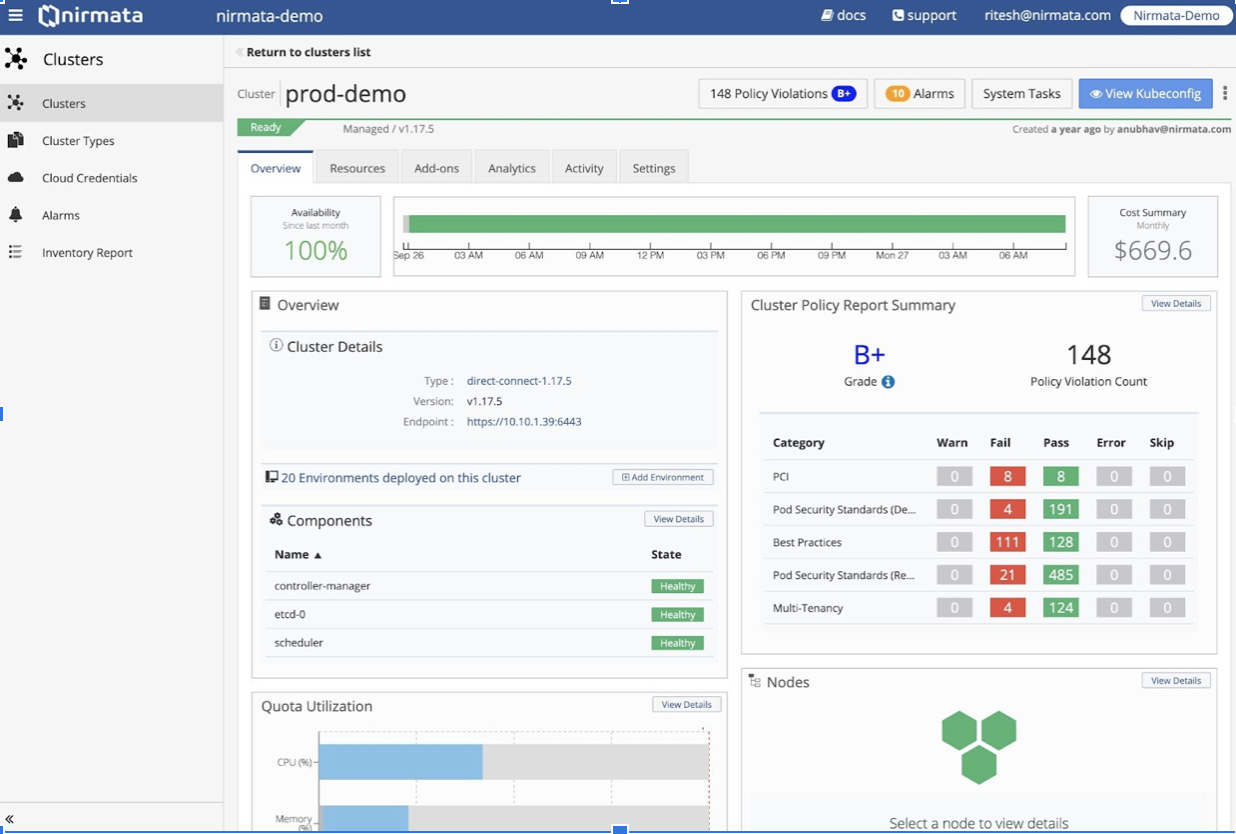Nirmata Kubernetes Platform
Photo Gallery
 |
|
|
Nirmata Kubernetes Platform

Additional Info
| Company | Nirmata |
| Website | https://nirmata.com |
| Company size (employees) | 10 to 49 |
| Type of solution | Cloud/SaaS |
Overview
Kubernetes can be highly customized, but DevOps teams need visibility into what’s happening in each cluster as organizations scale to ensure application reliability and security. With widespread adoption of Kubernetes (88%) especially in production environments (74%) by IT teams, it’s important to know what needs to be configured. Yet 80% of developers may still be unaware of what needs to be configured – and nor should they.
Nirmata’s Kubernetes Platform gives users the ability to focus on what matters – their workloads and applications – by aiding the adoption of Kubernetes policies rather than requiring users to learn and adopt new ones.
With the Nirmata Kubernetes Platform, the scalable, cloud-native control plane allows users to seamlessly manage all clusters, applications independent of where they are located. Policies can be managed from a single, intuitive interface. Unlike other solutions, the Nirmata Kubernetes platform was built for cloud-agnostic, multi-cluster Kubernetes management. It integrates with cloud providers (EKS, AKS, GKE, OKE, etc.) and infrastructure-based solutions (VMware, Nutanix, bare metal) and solves Day 2 Kubernetes challenges for enterprise DevOps teams with powerful, agile Kubernetes management.
Nirmata offers three versions of its solution: the Nirmata Enterprise Subscription for Kyverno, the Nirmata Cloud Native Policy Management and the Nirmata DevSecOps platform. All three versions are powered by the company’s policy management, Kyverno, which supports the company’s mission is to enable the automated management of cloud native applications in an infrastructure agnostic manner.
How we are different
Generating value in the infrastructure supporting businesses’ digital workloads requires DevSecOps teams to gain visibility into what's happening in each cluster and implement necessary guardrails as the organization scales. To do this requires a policy management solution that is built to handle the scale and complexity of Kubernetes environments which Kyverno, addresses through the following three key functionalities:
--Validate: The primary function of any policy management engine is confirming that all resource configurations are compliant and secure. Kyverno’s validate function allows high-level IT stakeholders to ensure that their DevOps and security teams are navigating their role securely and according to the cloud-native best practices.
-- Mutate: Given the dynamic nature of digital infrastructure and cloud services, enterprise IT departments are constantly updating their policy requests to maintain the proper use of resources in every environment. Kyverno’s mutation function automates the adjustment of these requests so they are in accordance with validation rules. Instead of simply rejecting non-compliant requests, the mutate function tacitly adjusts them to an acceptable format.
--Generate: A feature exclusive to Kyverno, generate rules allow for the creation of supplementary and supporting policies in the event that a new policy is created (or an existing one is updated).
Unlike other solutions that require users to learn a specific programming language, Nirmata offers native-language coding to its default security and GitOps-style workflow making it easy to use.
Continuous compliance within Kubernetes environments is crucial to maintaining successful enterprise operations within multi-cloud systems. The Nirmata team has intimate knowledge of Kyverno’s inner workings and combines this expertise with industry best practices in both container and policy resource management. The process of continuous compliance is born from this combination, and is the foundation of Nirmata’s Policy Manager service that provides enterprises the guidelines they need to maintain CI/CD.



